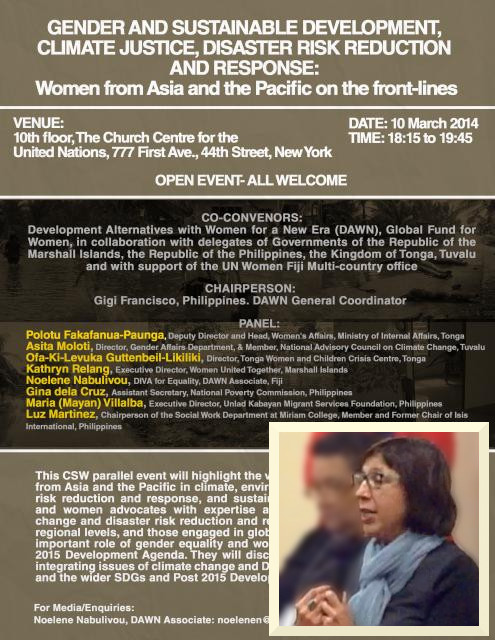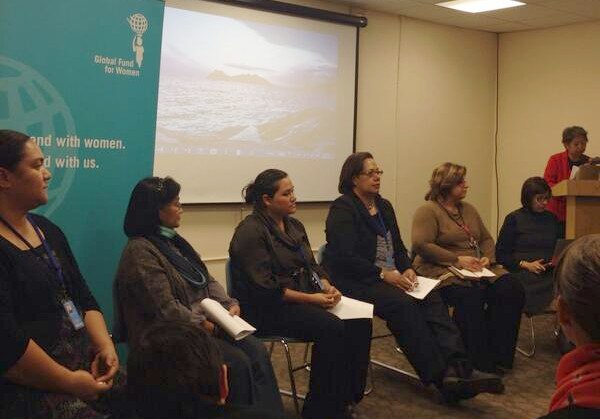
In addressing pressing issues regarding climate change and disaster management, it is useful to have a feminist framework in addressing such issues. This is what Luz Martinez, former Chair of Isis International, emphasised as she participated in the panel entitled ‘Gender and Sustainable Development, Climate Justice, Disaster Risk Reduction and Response: Women from Asia and the Pacific on the front-lines’ last March 10.
The interesting discussions were spearheaded by a panel that included women from the Pacific and the Philippines. Climate change is affecting the Pacific and the Philippines in more severe ways. Bringing in island states together to talk about this issue draws a stronger link into the Asia Pacific region. The panel was convened by the Development Alternatives with Women for a New Era (DAWN) and Global Fund for Women in collaboration with representatives and delegates of various governments in the Asia and the Pacific such as the Republic of Marshall Islands, the Philippines, the Kingdom of Tonga, and Tuvalu.
The current chair of the Social Work Department of Miriam College, Martinez urged that all actors involved in disaster risk reduction and management to basically rethink how disasters are approached, as they are not natural and could be averted if the proper structures and systems were actually in place. While there are unavoidable climactic changes happening, disasters do not have to necessarily follow them if people in charge are practicing good governance. Yet while greed gets the best – or worst – of a country’s leaders, the citizens are left without access to basic needs that could avert the escalation of disasters. She pointed to macro and micro level issues as possible enablers of disaster, from lack of economic resources to uneven power dynamics in a family. These are issues that could lead to situations where citizens would find themselves trapped in a system that has no safety net in place when push came to shove during disaster situations. In such pressing circumstances, it is often the women and girls who bear the brunt of such systems especially if they have unequal access to resources and are deprived of basic human rights.
 Martinez urges a rethinking of disaster management strategies by using a feminist framework which encourages a healthier and more equal participation of women in important decision-making processes. For instance, women should be involved more in the governance of communities from which their perspectives of care are incorporated as part of the democratic processes of a community. Bringing in women into governance of a community or a country because they care about what happens to their community (socially, politically and economically) is part of democracy. From a wider perspective, having a feminist framework is part and parcel of having a human rights approach to addressing poverty issues, for it is these kinds of issues that affect the whole community. She stressed that the alleviation of poverty needs to be focused in addressing vulnerability to disasters.
Martinez urges a rethinking of disaster management strategies by using a feminist framework which encourages a healthier and more equal participation of women in important decision-making processes. For instance, women should be involved more in the governance of communities from which their perspectives of care are incorporated as part of the democratic processes of a community. Bringing in women into governance of a community or a country because they care about what happens to their community (socially, politically and economically) is part of democracy. From a wider perspective, having a feminist framework is part and parcel of having a human rights approach to addressing poverty issues, for it is these kinds of issues that affect the whole community. She stressed that the alleviation of poverty needs to be focused in addressing vulnerability to disasters.
There are many ways that climate change and feminisms could intersect, and during her stint as former Chair of Isis International, Martinez oversaw Isis publications that will reflect these discussions such as special issues of Women In Action magazine on climate change, as well as the production of the Gender and Climate Change: Toolkit for women on Climate Change. These materials are accessible at the Isis website. Her long-time work at Isis provides this useful feminist framework in approaching disaster risk reduction and addressing climate change issues.
For more information on Isis materials and publications regarding gender justice and climate change, visit Isis International’s website (isiswomen.org) or follow the social media account on Facebook (www.facebook.com/IsisInternationalOrg). For more up-to-date information, follow Isis International’s Twitter account (@IsisIntl) where Isis women are livetweeting from the events until the CSW58’s conclusion on March 21.





 The
The 
 Isis Resource Center holds one of the largest feminist collections of materials in the Global South. With 40 years of publication experience, Isis holds a vast collection.
Isis Resource Center holds one of the largest feminist collections of materials in the Global South. With 40 years of publication experience, Isis holds a vast collection.